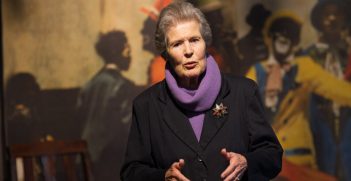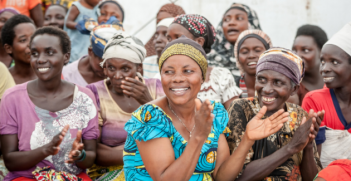Conflict Combatants Don’t Only Kill: Australia’s Leadership to End Impunity and Bring Justice for Survivors of Sexual Violence

Conflict-related sexual violence is increasingly used strategically by armed groups to oppress and displace enemy populations, eroding international norms. Australia’s diplomatic leadership is essential to combat this violence and restore justice, particularly in the Indo-Pacific region.
Conflict globally has reached levels not seen since World War Two. With this escalation of violence around the world, sexual violence perpetrated against civilians and combatants has also trended up. In 2024, the UN Secretary-General’s Security Council report showed a 50 percent increase in the use of conflict-related sexual and gender-based violence (CRSV) by conflict parties. This increase flies in the face of fifteen years of international efforts to prohibit its use as a weapon of war.
What is unique about sexual violence in conflict and politically fragile situations? In some conflicts, too many combatants don’t only seek to kill, they aim to destroy populations, ensure populations don’t return to lands, don’t flourish or rebuild. Sexual and gender-based violence is a tactic that facilitates this outcome, and conflicts are often conducted by all sides in a zero-sum game. No one wants to pursue justice because everyone has committed this crime. Sexual and gender-based violence is perpetrated with the intent to have an enduring impact on individuals and communities, subjecting them to widespread stigma, exclusion, and fear of return. The trauma as well as the stigma of this violence makes it more challenging for communities to recover from the devastation of war.
Sexual violence and gender-based targeting have become a routine part of 21st century war strategy intended to oppress the enemy group. The hope remains to eliminate it this century, yet such violence is increasingly normalised in communities affected by conflict, even after the fighting ends. What is driving this increase in CRSV perpetrated against women, girls, boys, men and LGBTQI+ individuals?
First, the rule-based international order, including its agreed norms on the laws of war and humanitarian treatment, are under threat. While they have always been subject to contestation and violation, these rules are not being enforced or underwritten by great powers on the UN Security Council. Friends and allies that order or permit this violence are immune. For example, in Ukraine, severe types of CRSV carried out by Russian forces have been documented by human rights organisations and Ukrainian prosecutors. Recently, a UN Commission of Inquiry on Ukraine concluded that Russian authorities “committed the war crimes of rape and sexual violence as a form of torture” against people in detention. There has been no attempt by Russia to investigate these allegations of human rights violations and war crimes.
The ongoing war in Ukraine has also intensified gender-based violence against civilians, according to a new study by the United Nations’ sexual and reproductive health agency (UNFPA) highlighting the voices of over 300 survivors: “Continued shelling fosters an environment of emotional exhaustion, prolonged stress and displacement, all of which contribute to increased gender-based violence.”
Second, in contemporary conflicts CRSV seems to be helping conflict groups achieve their strategic and tactical goals to dominate territory and populations. It generates widespread fear and drives populations out of territory, leaving these groups to control land and the remaining populations under force. We have witnessed these actions by Boko Haram in Northeastern Nigeria, the Rapid Support Forces in Sudan, M23 rebels in Democratic Republic of Congo, and ISIS/Daesh in Iraq and Syria.
Conflict-related sexual violence in the Indo-Pacific region
CRSV is an increasing issue in conflicts and politically fragile situations across the Indo-Pacific region. The sexual and gender-based violence being committed in this region is complex and contextual. Due to political complexity and limited humanitarian access, it is largely under-reported in conflict and displacement situations in Asia and the Pacific. In Myanmar following the military coup, the Junta have targeted civilians who oppose the regime for sexual violence, bombed hospitals and clinics impacting reproductive and maternity care, and failed to investigate UN and other independent bodies findings of crimes against humanity and acts of genocide, including rape, sexual torture, and reproductive violence, committed in Rakhine state and other situations. In Afghanistan, following the chaotic withdrawal of Western forces, the Taliban is committing egregious gender-based violations of human rights, including abductions and rape in custody, and impunity for gender-based honour crimes and forced marriages as reported at the UN Security Council meeting on 10 March. In Papua New Guinea, increased economic pressures, disasters, and political rivalries are fuelling land and tribal disputes, which have been associated with the rape and killing of women, men and young children with guns and machetes.
Conflict-related sexual violence is under-reported everywhere in the world due to stigma, access to care, and victims not surviving their injuries, but reliable documentation of reports of sexual violence during conflict is especially scarce in areas where there are either no national reporting systems or they are relatively underdeveloped. The scarcity of institutions to report to and/or their inaccessibility in conflict and displacement leads to extremely low investigation and conviction rates for CRSV, further undermining the incentive to report this violence.
Australia’s leadership and international gender strategy
Australia’s new international gender strategy makes ending sexual and gender-based violence a national priority. It aims to position Australia as a global Women, Peace and Security champion. This values-based diplomacy commits the country to working with international partners to hold states and conflict parties to account for committing war crimes and violating human rights. For example, Australia has joined with Germany, Canada, and the Netherlands to take the Taliban to the International Court of Justice (ICJ) for its violations of the United Nations Convention on the Elimination of All Forms of Discrimination Against Women (CEDAW), of which Afghanistan is a party. Australia has committed to increasing investment in sexual and gender-based violence prevention and response in Asia and the Pacific. This commitment is vital, especially following the disbanding of the US’s aid program, which has been a strong funder of sexual and gender-based violence prevention in this region.
International conference on fighting impunity and justice denied for CRSV victim-survivors
Considering the changing global environment, Australian diplomatic leadership is vital to address CRSV in the Indo-Pacific region. This is the focus of the International Conference, Justice Denied: Fighting Impunity for Conflict-Related Sexual Violence that we are co-convening in June with the Australian Institute for International Affairs – Victoria to coincide with the International Day for the Elimination of Sexual Violence in Conflict.
The conference aims to foster interdisciplinary dialogue and critical reflection on the current state of CRSV in the Indo-Pacific, including fragile situations and all forms of gender-based violence. It seeks to combine cutting-edge research with policy solutions, identifying diverse perspectives and experiences on CRSV within the region. It is committed to supporting survivor-centred networks and uplifting the voices of those who have experienced, witnessed, and investigated this violence. On the 25th Anniversary of the Women, Peace and Security Agenda, this conference will focus on survivor-centred approaches, the right to report, safe data collection, and access to justice with specific focus on the Indo-Pacific.
Conflict-related sexual and gender-based violence is political. It is a lead indicator of growing political instability. Tolerance of this violence, and the effectiveness of this violence, thrives in permissive ideologies, social norms, and institutions that enable CRSV. Denying justice to survivors and their communities holds us all back in the Indo-Pacific region from peace and prosperity.
Professor Sara Davies is a Fellow of the Australian Institute of International Affairs and a Professor of Government and International Relations at Griffith University and Deputy Director of the Australian Research Council Centre of Excellence for the Elimination of Violence against Women
Professor Jacqui True is a Fellow of the Australian Institute of International Affairs and a Professor of Politics & International Relations at Monash University and Director of the Australian Research Council Centre of Excellence for the Elimination of Violence against Women.





